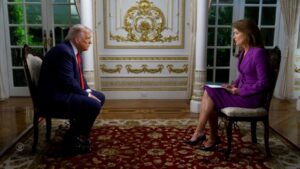In today’s chaotic information age, being part of the media isn’t just a profession — it’s a public trust. The Fourth Estate was built on the sacred responsibility to report facts fully, fairly, and fearlessly. Yet too many outlets now operate like corporations first and truth-tellers second, more concerned with optics and ownership than objectivity. If you’re in the media but afraid to tell the truth, if you’re scared of your own shadow — then you shouldn’t be in the industry at all. Because journalism without courage isn’t journalism; it’s marketing.
This week’s “Corporations Are People, My Friend” takes a hard look at CBS News and its flagship program “60 Minutes,” long heralded as the pinnacle of investigative reporting — and now, increasingly, a case study in what happens when corporate power and political pressure eclipse journalistic integrity.
The “60 Minutes” Problem: What Happens When Truth Becomes a Business Decision
CBS’s “60 Minutes” once set the standard for broadcast journalism. For decades, it was where truth met television — where Mike Wallace, Ed Bradley, Morley Safer, and Lesley Stahl held the powerful accountable. But what happens when the show itself becomes part of the corporate machinery it was built to question?
President Donald Trump’s latest interview with “60 Minutes” illustrates the problem perfectly. The 90-minute sit-down with Norah O’Donnell was cut down to less than 30 minutes for broadcast — a standard editorial move, CBS claims, but one that raises eyebrows given the omissions and the show’s troubled history with political editing. The full transcript later revealed entire segments removed, including discussions around cryptocurrency corruption claims, the economy, and the president’s feud with the network itself.
That alone would be concerning. But the backstory makes it worse: CBS had previously settled a $16 million lawsuit with Trump over an edited 2024 interview with then–Vice President Kamala Harris — an edit Trump alleged was politically motivated. The network denied wrongdoing but agreed to publish full transcripts of future interviews as part of the settlement. That move, while framed as a gesture of transparency, underscores a deeper issue: when legal pressure, corporate image, and political optics dictate editorial policy, journalistic integrity takes a back seat.
The Fallout: 18 False Claims, 0 Accountability
Trump’s interview itself was a cascade of misinformation — at least 18 false or misleading statements ranging from the economy and inflation to Ukraine, immigration, and the 2020 election. Many of these claims had been publicly debunked long before the interview. Yet, rather than providing real-time corrections or rigorous context, CBS allowed the president’s remarks to air largely unchallenged, leaving viewers with sound bites instead of facts.
This is where the media’s moral responsibility comes into play. The job of a journalist isn’t to merely record what’s said; it’s to interrogate it. When the stakes involve democracy, economic stability, or the public’s understanding of reality, the truth isn’t optional. It’s the whole point.
CBS aired only 28 minutes of the 90-minute conversation, posting a 73-minute “extended” version online. The rest? Edited for “clarity.” That’s corporate code for “filtered for risk.” When you selectively sanitize the truth, you’re not serving your audience — you’re serving your shareholders.
Journalism vs. Corporate Control: The Paramount Factor
Adding to the complexity is CBS’s recent ownership change. Paramount Global, the parent company of CBS, was sold to Skydance Media, run by David and Larry Ellison. The move was framed as a bold new chapter for media freedom — but insiders have already described rising corporate influence in editorial decisions. Trump himself praised the sale, calling it “the greatest thing that’s happened in a long time to a free and open and good press.”
That statement, coming from a politician notorious for attacking journalists, should make anyone in media shiver. When billionaires and politicians start applauding each other’s control of the press, it’s no longer a free press — it’s a franchise.
The appointment of Bari Weiss as CBS’s new editor-in-chief was similarly polarizing. Weiss, a self-styled advocate for “free speech” journalism, has been celebrated by some as a return to intellectual diversity and condemned by others as a signal of corporate realignment. Either way, it illustrates the point: the modern media landscape is now as much about branding the narrative as it is about telling the truth.
The Broader Context: Why Media Accountability Matters Now More Than Ever
To be clear, CBS and “60 Minutes” are far from the only outlets wrestling with this crisis of credibility. Every major network — from Fox to MSNBC to CNN — has faced similar accusations of bias, editing controversy, and corporate interference. The problem isn’t just “fake news.” It’s the fear that comes with losing access, advertising, or audience share.
Journalists today operate in a climate of fear — fear of backlash, of losing funding, of angering powerful figures. But journalism that fears the powerful isn’t journalism at all. The very reason the press exists is to confront power, not comfort it. If CBS or any network wants to call itself a legitimate news outlet, it must hold everyone — from presidents to CEOs — to the same standard of truth.
The Facts vs. the Fear: Where CBS Still Stands
It’s worth acknowledging that CBS and “60 Minutes” remain respected institutions. They’ve won more Emmy Awards than any other primetime program, along with countless Peabody and duPont-Columbia Awards for investigative reporting. Independent media monitors like Ad Fontes Media still rate CBS as generally reliable and fact-based, leaning slightly left but not radically biased. Public trust surveys place CBS on par with ABC and NBC in credibility.
But that trust is fragile. One heavily edited interview, one corporate directive, or one act of selective storytelling can erode decades of credibility. The network’s journalistic legacy can’t survive if it sacrifices transparency for convenience.
The Takeaway: Do Your Job or Get Out of the Way
The responsibility of the media isn’t to make people comfortable — it’s to make them informed. When reporters fear the truth, when producers prioritize image over integrity, when executives dictate coverage based on ownership interests, we lose the very foundation of a free press.
CBS and “60 Minutes” still have the opportunity to lead — to return to the hard-edged, fearless journalism that once defined them. But leadership means transparency. It means releasing full, unedited interviews without corporate spin. It means giving viewers context, not clickbait. It means telling the truth, even when the truth makes the powerful squirm.
Because if the press won’t hold power accountable, who will?
Bottom line: Journalism without courage is just PR. And if a news outlet isn’t reporting the facts 100% of the time, then it’s not part of the solution — it’s part of the problem.
The media doesn’t need to choose between access and accountability. It just needs to choose truth — every single time.
This article is part of the ongoing “Corporations Are People, My Friend” series, which examines the intersection of corporate influence, accountability, and the public good in modern America.



